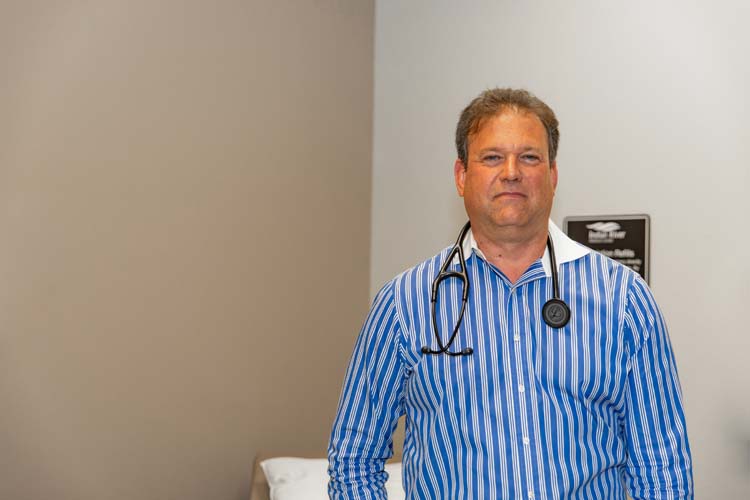Dr. David Hurst, a family practice physician, is now with the Indian River Medical Center’s Primary Care South at 4165 9th Street SW (Oslo Road).
He didn’t have to travel far to get here but he did need to log over 20,000 miles to get his medical degree and return to his home state of Florida.
“I grew up in Miami,” says the affable Hurst, “and I worked in Miami and Fort Lauderdale. I met my wife in Miami around 1997, and she’s from the Philippines.”
So Hurst, a former medical recruiter, set his sights on something he says he’d “always wanted” and decided to leave recruiting behind to become a doctor, himself.
He enrolled at the Cebu Doctors’ University in the Philippines, earned his medical degree and went on to serve an internship at the Cleveland Clinic and a residency at Memorial Health University Medical Center in Georgia before returning to Florida.
Just prior to signing on at IRMC, Hurst was with the Heart & Family Institute in Port St. Lucie, where he garnered a 2017 patient satisfaction award from WellCare and a 2017 Humana certificate of achievement.
One area of special interest for Hurst is checking for and treating osteoporosis.
The word “osteoporosis” means “porous bone,” and the National Osteoporosis Foundation defines condition as “a bone disease that occurs when the body loses too much bone, makes too little new bone, or both. As a result, bones become weak and may break from a fall or, in serious cases, from sneezing or minor bumps.”
Osteoporosis takes a serious toll on older Americans. One in every three women, and one in four men, over the age of 50 suffers a broken bone due to osteoporosis with an annual cost of roughly $19 billion.
Worse, says the National Institutes of Health, “for older people, weak bones can be deadly. One in five people with a hip fracture dies within a year of their injury.”
Fortunately, according to Hurst, a bone density test – which he describes as a modified X-ray – can spot the disease in its early stages and there are now a variety of prescription medications (bisphosphonates) available to treat the disease and some of the newer drugs even help rebuild damaged bones.
“Prolia,” Hurst continues, “is a newer [class of drug] that we’re going to start giving at this office. It’s a shot, like a flu shot, every six months.”
Turning to a pop culture reference to explain the situation, Hurst says these drugs inhibit what he calls the “pac-men” that “eat your bone away. They’re called osteoclasts. They cleave or break down bone. In osteoporosis a lot of them are going haywire. These classes of meds inhibit those pac-men.”
Oddly, human men appear to be at something of a disadvantage when it comes to being screened or treated for osteoporosis.
“Unfortunately, insurance doesn’t cover men’s screening very well,” Hurst says, and neither does Medicare.
However, if men have certain underlying conditions or are currently taking certain medications, insurance may cover their screening, so it’s wise to ask.
Meanwhile, with or without a diagnosis of osteoporosis, Hurst says he’s also firmly in the camp of those who now realize continual updating of every patient’s prescription list is a must-do priority.
“Every single visit we do a med reconciliation,” he says. “That’s what our job is: to look at the whole body, the whole picture [and that includes] looking at a patient’s entire med list.”
It’s all too common, according to Hurst, to spot a prescription on those lists and say, “‘this one is not a good idea with that one.’ I mean, it is a big problem.”
And problems are what Hurst is hoping to help his patients avoid.
Dr. David Hurst is with the IRMC’s Primary Care South at 4165 9th Street SW (Oslo Road) suite 106 in the Publix shopping center. The phone number is 772-569-7706.

